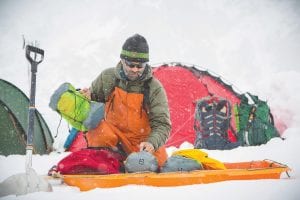Lonnie Dupre works on his gear in the mountains of Nepal. Dupre is leading a group of climbers up Mount Langju, a 20,000-foot peak in the Himalayas that has never been climbed before. As they climb, he and his fellow mountaineers will collect snow samples for scientists to test for micro pollutants, as well as volunteer and work with the Rose International Fund for Children when they are off of the mountain.

After scouting several mountains last year, Grand Marais adventurer and outdoor educator Lonnie Dupre and his crew of three climbers returned to Nepal and is currently attempting an ascent of Langju, a 20,885-foot mountain that has never been climbed before.
The group, which Dupre calls “Vertical Nepal”, began their ascent on October 4th and hope to finish by November 10th.
Making the climb with Dupre are Elias de Andres Martos, who grew up in the mountains of Spain. Elias is a professional guide working in the Rocky Mountains, the Andes, Alaska and Nepal.
Pascale Marceau was born in Sudbury, Ontario and has transitioned from the life of an engineer to a life as a consultant and now lives in the Canadian Rockies where she is focused on climbing and alpinism.
Bridget Schletty was born in St. Paul and worked as a language teacher, coach, and trip leader, exploring the local wilderness with her students. Currently she spends winters in Colorado where she is a staff member for RMI expeditions.
Langju, as described by Dupre, “is a majestic stand-alone peak in the remote Tsum valley; an attempt at its first ascent is the focus of this five week expedition.”
Nepal is the home of nine of the 10 tallest peaks in the world. Recently the government has opened some of the 20,000-foot-tall peaks to climbers, which was good news to Dupre who has been interested in that area for years.
For Dupre, who has spent the last 30 years of his life dogsledding across the high arctic areas of the globe, climbing mountains, or cross country skiing or kayaking frigid waters, this trip is far more than just a serendipitous adventure.
As they climb Vertical Nepal they will collect water samples from high altitude lakes, streams, glaciers, and snow samples. These samples will be sent to Adventures & Scientists for Conservation (ASC) Worldwide Micro plastics, which will test the water samples taken from various altitudes to see if they contain micro plastics.
Micro plastics (plastic particles), said Dupre, “enter our waterways and pose an environmental and human health risk when they enter the food chain.
“The goal is to understand the sources of origin in order to curb micro plastics pollution,” said Dupre.
Animal scat samples will also be collected and sent to the lab for testing. Through scat samples scientists hope to create a genetic library that can be used for early detection of wildlife diseases.
Some human feces will also be collected, bagged, and sent to Harvard Medical School.
“Antibiotic resistance is a growing human health issue. The goal is to discover the biological root of the antibiotic resistance by identifying ancestor Enterococcus bacteria,” Dupre said.
Once they are off of the mountain Vertical Nepal will spend a couple of weeks volunteering their time with The Rose International Fund for Children (TRIFC), whose mission is to improve the lives of children with disabilities in Nepal.
When it comes to leading an adventurous lifestyle, Lonnie comes from some good stock. His grandfather was Jacques Cartier, the French explorer and founder of Quebec.
Dupre, who is a carpenter by trade, has lived his adult life dedicated, “To pioneer expeditions in the coldest regions of the globe to inspire, educate and advocate for the environment and indigenous cultures.”
Many awards, honors, and tributes have been bestowed on Dupre. Some of those include: National Geographic (best adventure of 2005), the Rolex award for enterprise in 2004, Polartec Challenge award 2000 & 2001; National Explorers Club 1996; Winter Olympics, Oslo, Norway, 1994. He has appeared on the “Tonight Show with Jay Leno,” “Good Morning America,” CNN and ABC News as well as in print in the New York Times, LA Times and more.


Loading Comments